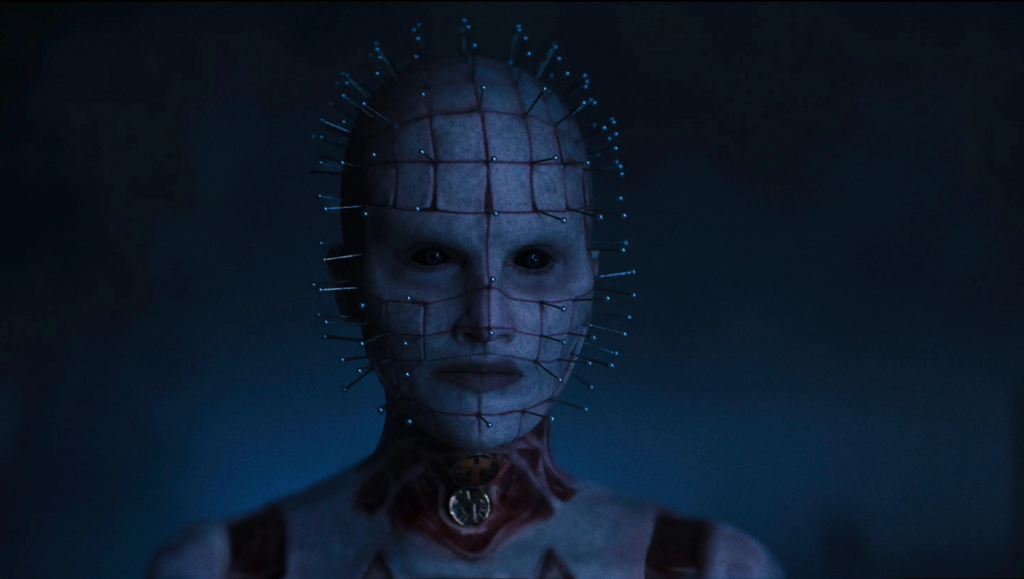2022’s Hellraiser is the most faithful and respectful franchise entry since its glory days, but it’s far too safe and straightforward to reclaim the original duo’s brutal and kinky magic.
Way back in 1987, author Clive Barker adapted his novella The Hellbound Heart as Hellraiser, at the time a truly transgressive and graphic horror film that not only featured some impressive grue, but was sexually frank in a way that the majority of genre entries weren’t. It was unexpected, daring, and a bit amateurish. It also ushered in a new iconic horror character, the Cenobite “Hellpriest” that fans nicknamed Pinhead, played by actor Doug Bradley. A sequel, Hellbound, followed a few years later, then a ton of sequels got dumped into the market over the ensuing decades, at least one if not more instances as a result of the Weinsteins buying some cheap script on spec and insisting that it be rewritten to have Pinhead show up two or three times. The franchise stagnated and fell into disrepair.
But everything lasts forever now. Welcome to Hellraiser, 2022 edition. Less a direct sequel than a further iteration, it boasts lovely production design, a reasonable amount of gore, and a new Pinhead (Jamie Clayton), and it valiantly, if not quite successfully, tries to live up to the spirit of the series. Riley (Odessa A’Zion) is an addict attempting to stay in recovery, living with her supportive (but deeply frustrated with her) brother Matt (Brandon Flynn). Riley’s shifty boyfriend Trevor (Drew Starkey), who’s not exactly a good influence for her sobriety, one day brings home what fans will recognize as The Lament Configuration, an ancient puzzle box that, of course, the characters have no idea opens a doorway to hell, where they’ll be tortured for eternity by demons who prize the experience of extreme pain beyond all others. Seems a little disingenuous to create a magical toy that sends non-consenting random people to your snuff BDSM dimension, but hey, we’re not trying to kink-shame anyone.
When Matt is taken by said demons, the Cenobites, Riley, Trevor, and a couple other pals head to the spooky mansion of Voight (Goran Visnjic), a reclusive rich guy who supposedly knows the secrets of the puzzle, to try to rescue Matt, or at least understand his fate. It’s a sturdy premise for a sequel to this series. The mansion is sufficiently eerily designed, with all sorts of architectural flourishes that highlight the building’s relation to the scary puzzle box, its walls and rooms shifting ominously. When the monsters show up, ripping their victims apart with flying chains, it’s satisfyingly gory. But the original core duo of Hellraisers traded on a tantalizing combination of derangement and extremity; the narratives were oblique at best, lumbering between often shocking and frequently heavily sexualized bits of bodily destruction without much connective tissue. This new installment, however, lays out pretty concrete rules for what the puzzle box can do and how the demons they summon will behave. It results in a decided lack of mystery here, and what’s more, the overtly sexualized body horror is replaced by more straightforward dismemberments. It’s admirable that this Hellraiser makes analogues of, say, Riley’s addiction and tendency toward self-harm and the torture inflicted on the Cenobites’ victims, but that simply doesn’t go far enough. Fans won’t be disappointed in the aggregate, as this is easily the most faithful and respectful sequel in the series since its glory days, but it’s also reflective of a more broadly tepid period of genre filmmaking. There shouldn’t be anything safe or concrete about a Hellraiser movie.
You can stream David Bruckner’s Hellraiser on Hulu beginning on October 7.


Comments are closed.